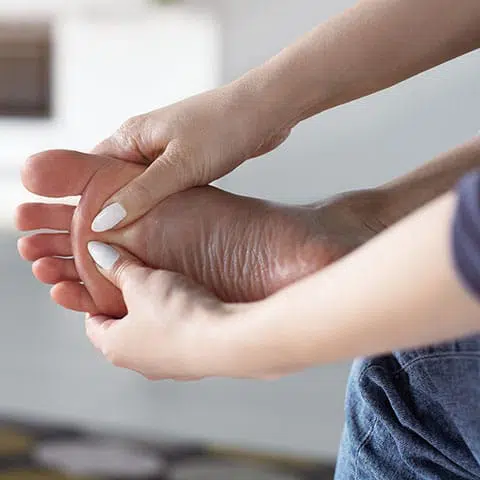Nerve Pain

Appointment Inquiries
Call us at: (877) 222-5348
Definition
Nerve damage in the hands and feet that can cause weakness, numbness, and pain.
Root Causes
"Pins and Needles", Burning Sensation, Dizziness, Extreme Sensitivity to Touch, Muscle Weakness, Numbness + Tingling, Poor Balance, Stumbling
Risk Factors
Alcohol Consumption, Diabetes, Kidney Conditions, Liver Conditions, Lyme Disease, Repetitive Motion Injury, Rheumatoid Arthritis, Shingles
Treatments
Chiropractic, Nutritional Advice, Physical Therapy
What is nerve pain?
Nerve pain is a pain condition that is usually chronic. This is usually caused by nerve damage due to disease, injury, or infections.
When nerves are damaged, they fail to deliver sensory information back to your brain. They might send signals of pain when there’s nothing causing pain, or you might not experience pain when you should. This can be very scary because pain is what informs us of trouble.
People with nerve pain may experience shooting, burning pain. The pain may be constant or may occur intermittently. A feeling of numbness or a loss of sensation is common, too.
Nerve pain tends to get worse over time.
What are the symptoms of nerve pain?
Based on the type of nerve that is damaged, your symptoms can be classified into three categories:
- Sensory nerves transmit sensations such as touch and pain. Sensory nerve damage symptoms can vary wildly. Generally, lesser nerve damage may show as the inability or extreme sensitivity to pain, while more nerve damage may lead to coordination trouble.
- Motor nerves control the muscles for movement, such as walking. Muscle weakness and cramps are the most common symptoms of motor nerve damage. If left untreated, severe cases may lead to partial paralysis.
- Autonomic nerves control unconscious activities such as breathing, digesting food, and heart operation. If damaged, you may have heat intolerance, you may sweat a lot or not at all, your blood pressure may change, and you may have digestive problems.
While symptoms can be generally categorized as such, there are a number of symptoms that most people with chronic nerve pain experience. These include:
- Burning sensation
- Dizziness
- Extreme sensitivity to touch
- Muscle weakness
- Numbness and tingling
- Pain when you walk
- Pins and needles
- Poor balance
- Sensation of vibration or skin crawling
- Stumbling or falling
- Sudden, sharp pain
- Trouble sleeping
- Trouble swallowing
Chronic nerve pain symptoms often affect the toes and fingers first. Over time, symptoms can move up into the hands and feet, then into the leg and arms. They are often symmetrical, affecting both sides of the body at the same time.
What causes nerve pain?
Nerve pain may develop for short-term (acute) reasons or it may be chronic. It can be acquired, or idiopathic (unknown cause). Acquired nerve pain is often from injury, infection, vitamin deficiency, or diabetes.
Nerve pain can be acute. It is usually caused by some types of insecticides, autoimmune disorders like Guillain-Barré syndrome (GBS), and some antibiotics, anticonvulsants, and sedatives.
Chronic nerve pain is often idiopathic. However chronic causes are often associated with exposure to poisons or heavy metals, hypothyroidism, and nutritional or vitamin deficiencies, especially vitamins B1, B6, and B12.
It may be acute or chronic, and you may experience periods of remission.
What are the risk factors?
Higher risk factors for developing nerve pain include:
- Alcohol abuse
- Diabetes
- Kidney conditions
- Liver conditions
- Lyme disease
- Repetitive motion injury
- Rheumatoid arthritis
- Shingles
Lifestyle choices can also play a key role in preventing nerve pain. From alcohol intake to food choice, vitamin intake, weight loss, toxin avoidance, and regular exercise.
What can BackFit do for nerve pain?
Our doctors at BackFit Health + Spine will perform several tests to diagnose the type and severity of the nerve pain that you have and what is causing it. Family history and a physical examination will help us discover what parts of your body are most affected by nerve damage, including discovering any atrophied muscles from the damage. We may also perform a nerve conduction velocity test.
Chronic nerve pain is a complex condition with many different treatment methods. Here at BackFit, we focus on freeing up the nerves with chiropractic adjustments, as well as prescribed exercise with physical therapy. For some cases, we also will recommend nutritional testing, advice, and supplementation. These methods resolve many patients’ worst pain complaints.
If your case is more advanced, we will refer you to our pain centers for a variety of options for treatment. These include lumbar sympathetic blocks, medication, and in rare cases, a spinal cord stimulator trial implant.
In many cases, you can help reduce nerve damage by catching it early. If it is progressive, getting treatment early also helps manage pain or discomfort before it becomes worse.
More About BackFit
Looking to learn more? Explore our locations, treatments, or our new patient offer below or contact one of the BackFit Family of staff to have your questions answered.


